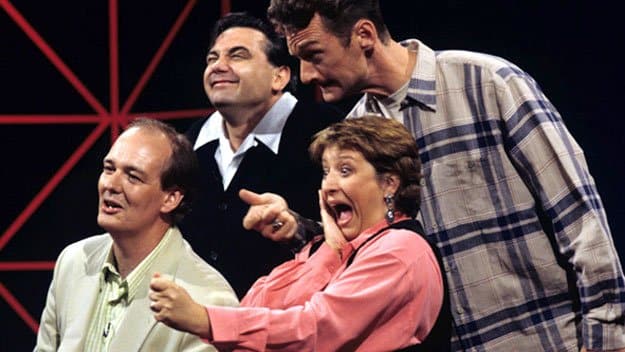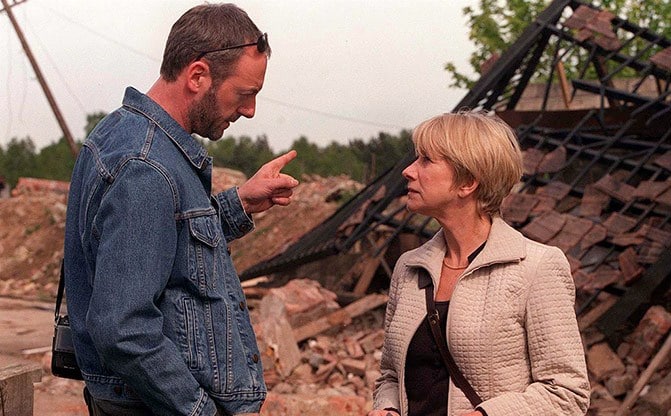The Simple Guide to Learning English with TV Shows

Research shows that you can actually learn English with TV, as long as you have the right shows and the right learning techniques.
In this guide, I’ll show you English TV shows that work well for language learners, along with study methods that are backed by science.
Download: This blog post is available as a convenient and portable PDF that you can take anywhere. Click here to get a copy. (Download)
What Types of TV Series Should English Learners Watch?
TV can help English students improve various skills, including listening comprehension, vocabulary building and even conversing.
When you watch a movie, for example, you practice listening to words and phrases in context. The visual elements provide clues to help you understand unfamiliar vocabulary and expressions. As your vocabulary increases and you get more exposure to native speech, you can level up your own verbal abilities, too.
Another great thing about TV is that there is a wide range of engaging material for you to learn from. Here are just a few examples of the different series, movies and genres you can explore:
- Sitcoms: These popular comedies will make you laugh while you learn English. Here are the 10 best ’90s sitcoms for English learners and 10 great modern American sitcoms.
- News programs: Here are nine essential news sources for learning English, plus a guide to learning English through the news.
- Movies: Check out these 10 modern American classic movies for language learning, as well as these seven blockbusters (very popular/successful movies) English learners will enjoy.
The 10 Best Series with American and British Versions
As an English learner, the two major dialects you’ll encounter the most would be British English and American English. Luckily, there are also English TV series with versions for each, so you can pick your preferred version and start watching:
1. “The Office”
Type: “Mockumentary”/Comedy
What You’ll Learn from This TV Show
“The Office” is a “mockumentary,” which is a type of show that pretends it’s a documentary. This means that each episode is filmed like everything is unplanned. When you watch the show, you’ll feel like you’re seeing real people in a real office.
The show is very funny and very awkward, so it might make you laugh or it might make you a little uncomfortable—or both!
The best thing about “The Office” is that everything happens in an office.
This means you can see how the coworkers and the boss talk to each other in English. Of course, the interactions here are a little bit different from real life. In this office, there are some very weird characters and silly personalities, but there are also many great English lessons to learn.
You can see American English and British English being used in an office. You can hear plenty of office vocabulary and phrases, as well as some casual language. Here’s a language lesson with the American version from our YouTube channel:
Each version of the TV series also shows each culture’s idea of a terrible boss. The other characters can teach you what’s considered “weird” in each culture. How is the “weird” character in each version different?
British Version
Watch on: Amazon Prime | Hulu
The British version of the show stars the popular comedian Ricky Gervais. He’s the boss of a paper company in a little town in England.
American Version
Watch on: Amazon Prime | Google Play | Vudu
The American version stars the comedian Steve Carell and takes place in a paper company in Scranton, Pennsylvania. The series is based on the British version, but people speak and behave in very American ways.
2. “Being Human”
Type: Drama/Fantasy
What You’ll Learn from This TV Show
In “Being Human,” three young people start living together as roommates. These are not ordinary people, though
Both the British and American versions use the same idea and basically the same plot, but they’re shown differently.
Watching this show gives you an interesting look at what American and British people like to watch on TV. The show is also a good way to learn how young people in both countries speak with their friends.
British Version
Like I said before, these are not ordinary people. One is a vampire, another is a werewolf and the third person is a ghost. The show follows them as they try to hide their secrets from the world.
The British version of the show is very focused on the challenges they experience because they aren’t human.
American Version
Watch on: Amazon Prime | Vudu
When America adapted (changed for a different region/situation) the show from the British version, the characters and plot stayed the same.
However, the American version focuses more on the characters and their relationships. It also tries to be more realistic, creating scenarios and personalities you can actually believe instead of focusing on action.
3. “Changing Rooms” (U.K.) — “Trading Spaces” (U.S.)
Type: Reality show
What You’ll Learn from This TV Show
Two people are given a small amount of money and time to change a room in each other’s houses. It’s a fun “reality show” (a show focused on real people, which has no script) that shows what happens when you trust someone else to decorate your home.
As you learn English with this TV series, ask yourself:
- How do people interact with each other?
- How do people speak when they’re under pressure and feeling stressed?
Watch this show and hear some real language used by native speakers. There are no actors reading written lines. All of these things are really happening to them, and they’re really reacting to everything that happens!
What do people say in English when they’re very happy or excited? What do people say in English when they’re very sad, frustrated or disappointed? Watch this show to find out! Because the language usage is very authentic, you’ll see some very real differences in language and culture.
British Version
Watch on: Amazon Prime
The British version is called “Changing Rooms,” and it’s a very positive show.
American Version
Watch on: Amazon Prime
The American “Trading Spaces” is very similar to the British “Changing Rooms.” People try to decorate each other’s rooms.
However, the American version loves to make things more dramatic. They show you negative emotions as well as positive ones. In one famous episode, a woman is very upset about some of the changes made to her home. She said some very strong, negative things in English!
4. “Skins”
Type: Teen drama/Comedy
What You’ll Learn from This Show
“Skins” is a dark comedy. A “dark comedy” is a funny type of show, but it often includes some sad, scary or ugly things.
This show is about the lives of teenagers as they learn more about themselves and each other. They are trying to do the best they can in life while growing up.
“Skins” shows teenagers facing both adult and teenage problems, and it uses plenty of slang in both versions. This means that you can learn both British and American slang with this TV series!
British Version
Watch on: Hulu
There’s plenty of drama in the British show, but the characters also try to find humor in the things that happen to them. The British version changes the main actors often, so you can hear a wide range of English accents and ways of speaking.
American Version
Watch on: Amazon Prime
The series didn’t last long in the U.S.
This is possibly because it tried to discuss some difficult issues. The American version shows some sexual scenes, and some are difficult to watch, so it’s definitely not a good show for everyone to watch.
5. “Law & Order”
Type: Crime drama
What You’ll Learn from This TV Show
This show will teach you a little bit about the justice system of both Britain and the U.S.
Of course, it’s still a TV show and it isn’t completely accurate. Many times, it doesn’t show exactly how things work in the real world.
However, it’s still a good show to watch if you’re interested in a career in the justice system or anything related to it. You’ll learn lots of legal and formal vocabulary. Both versions of the show also have a good mix of casual and professional language.
American Version
Watch on: Amazon Prime | iTunes
You might know the American crime drama “Law & Order” already. It shows the way the American justice system catches criminals and takes them to court.
Impressively, the show has been on TV for 20 seasons! There are many, many episodes to watch.
British Version
Watch on: Amazon Prime | iTunes
You might not know that there’s a British version of the show. The British version is very similar to the American version, but the location isn’t New York City, it’s London.
6. “Whose Line is it Anyway?”
Type: Comedy
What You’ll Learn from This Show
“Improvisational comedy,” often shortened to “improv,” is a type of comedy where the actors make up their jokes as they go. The jokes are not written before the show. Everyone must be very creative and say new jokes based on the situation!
“Whose Line is it Anyway” puts some great comedians together, gives them ideas and then lets them make up their own funny jokes.
Watch this show to see what American and British people find funny. Humor is a great way to learn more about a culture, and understanding humor is a huge step towards really understanding a language.
British Version
Watch on: Amazon Prime
This show began as a radio show in Britain and was later turned into a TV show. Of course, the British version features many British comedians.
American Version
The American version has some of the same games. However, the same group of American comedians appears in many, many episodes.
Like the British show, the American series also uses some musical games and often asks for suggestions from the audience.
7. “Hell’s Kitchen”
Type: Reality/Game show
What You’ll Learn from This Show
The biggest star of this show is the famous chef Gordon Ramsay. Ramsay is a British chef who is known for his bad temper, and he appears in both the American and British shows.
Watch these shows to see how the chefs act around Ramsay–and how Ramsay reacts to them in turn. Their interactions are a huge part of what makes it so entertaining!
Since the chefs come from many different places and backgrounds, you can also hear many different styles of speaking. Please be aware that Ramsay is known for using plenty of bad language. Expect lots of cooking terms and cursing.
American Version
Watch on: Amazon Prime | Hulu
“Hell’s Kitchen” is another reality show, but it’s also a “game show”—a show where people compete to be the best at something. Contestants in “Hell’s Kitchen” compete to cook the best dishes under difficult circumstances.
British Version
Watch on: YouTube for clips
The British version is very different from the American show. It’s less about the competition and more about learning to cook and maintain a restaurant business.
8. “Prime Suspect”
Type: Crime Drama
What You’ll Learn from This Show
“Prime Suspect” is one of those TV shows where there are major differences between the British and American versions. Either way, it’s a very popular police drama, and you’ll learn a lot of crime-related terms, such as “cuff” (to put handcuffs on someone) and “dead on arrival” (when a patient’s already dead by the time they get to the hospital).
British Version
Watch on: Amazon Prime | ITV
“Prime Suspect” is a crime drama about a woman leading a team of mostly male policemen and investigators on the hunt for a killer. This series has a serious tone and focuses on the drama and the interaction between the different genders.
American Version
Watch on: Amazon Prime | NBC
Both versions of the show share the same basic story, but the American version has been changed to appeal to an American audience. The lead character’s entire personality has changed, and the drama is exaggerated (made bigger and more dramatic).
Many other changes make the American version a completely different show from the British one.
9. “Sirens”
Type: Comedy
What You’ll Learn from This Show
“Sirens” is a show about a group of EMTs (Emergency Medical Technicians) who show up with ambulances to help anyone who’s injured.
Instead of focusing on the medical part of the show, the series is more about the characters. This means you get to see people interacting naturally, in many different kinds of situations. (Please be aware that “Sirens” has sexual content and language.)
British Version
Watch: Amazon (make sure your DVD player will play Region 2 discs first!).
The British version is dark, but it’s also very funny. An odd group of coworkers has to deal with many strange situations. They like to make jokes, and they use dark comedy to make sense of life (and death).
American Version
Watch on: Amazon Prime | Hulu | Vudu
The American version is set in Chicago, and it takes things much more seriously. It isn’t as funny as the British version. It’s more dramatic!
10. “The Two of Us” (U.S.) — “Two’s Company” (U.K.)
Type: Comedy
What You’ll Learn from This Show
This show is a great addition to this list. It’s a classic from the 1970s!
It’s an especially interesting look at the differences between British and American cultures and language since it shows people from both places interacting.
The language can be a bit outdated (old) because this is an older show. However, it’s a good way to see how things have changed—or not—over the years.
It’s also a good way to hear the differences between accents and ways of speaking. Keep in mind that the butler (in both shows) speaks in a very exaggerated way.
British Version
Watch on: Amazon Prime
An American author hires a British butler to take care of her house while she works. The series shows how the two get along, or—more often—don’t.
American Version
Watch on: Youtube for clips
In this version, an American TV show host hires a British butler.
How to Learn English with TV: 5 Research-based Methods
Now that you’ve probably got a few TV series in mind, here’s what the research says about how to learn English with TV!
1. Review New Words with Spaced Repetition
What the Research Says
Research on language acquisition like this study in the Journal of Verbal Learning and Verbal Behavior supports a popular language learning technique called “spaced repetition.”
In a nutshell (just a few words), spaced repetition involves reviewing new material (like a vocabulary list, for example) at regular intervals over a period of time. Typically, the intervals between reviews get longer and longer each time.
The study also found that the more space between repetitions, the better you’ll remember the language concepts.
Why This Matters for English Learners
Instead of cramming (memorizing all at once) 100 new words every day, learners should space out their training sessions across a week or even a month.
For example, if you see a phrase you do not know today, look it up in the dictionary and make a flashcard to review again at the end of the day. Afterwards, you should review the phrase within the following three days, six days, etc.
As the research indicates, this process helps set the phrase into your long-term memory, which means you learn more efficiently.
How to Watch English TV with Spaced Repetition
Step 1: Pick an episode (or a scene) in your favorite show.
Step 2: Watch it once and write down new words or expressions.
Step 3: Watch it again after one day, three days and six days, until the new phrases and their sounds stick. It is best to have the subtitles on each time, so you see the words in repetition while recalling their sounds.
2. Watch Before Sleeping for Better Recall
What the Research Says
Research shows that a one-hour nap can significantly boost and restore brainpower.
The research involved two groups of people who were given a difficult learning task. One of the groups was permitted to take an hour nap in the middle of the day; the other group had no nap. Researchers found that the people who napped did much better on the learning task and actually improved their ability to learn.
These results support the hypothesis (idea or guess) that sleep helps clear our short-term memory storage to make room for new information.
Why This Matters for English Learners
The implication of this study goes beyond the advice that we should get enough sleep at night and take naps during the day. English learners can actually adjust their studying habits to be more efficient based on this study.
Specifically, you can schedule listening practice with English TV around your bedtime or naps.
How to Schedule Watching English TV
Step 1: Half an hour before you plan to go to bed or take a nap, turn on an English-language TV show that you find interesting.
Step 2: Listen actively, taking notes or repeating what you hear out loud.
Step 3: Write a brief summary of the content as well as new things you have learned in English.
Step 4: Set the note aside and get to sleep. Let sleep work its magic.
Step 5: Review your notes the next day. Pay attention to your ability to recall new words. Keep a record of the new information you successfully recall and make flashcards or notes for the information you do not remember.
Recommended TV Shows
Programs created for English learners work especially well with this method since it is designed to help you retain information. Try watching BBC Learning English before you go to sleep or take a nap. You will wake up with their helpful English language lessons locked in your memory!
3. Read Along with English Subtitles
What the Research Says
According to this study published in PLOS ONE, watching subtitled English-language content has a positive impact on English listening skills.
In the experiment, a group of intermediate Spanish-speaking English learners watched a one-hour TV drama with subtitles, while another group watched it without subtitles. After watching, they all took a listening test, and the results from the first group were significantly higher than those of the second group.
The study shows the benefits of reading subtitles as a tool to improve listening skills.
Why This Matters for English Learners
Aside from making TV series less confusing to watch, English subtitles can be useful for dual reading and listening. While you’re reading English subtitles, you’re also hearing them being said out loud–which can make words much more memorable for you. Keep trying with each episode, and your listening comprehension will improve!
Regular English subtitles can be pretty challenging to study with, though, because you might end up pausing too much to look up words.
For English subtitles that are meant for studying, there’s also FluentU.
FluentU takes authentic videos—like music videos, movie trailers, news and inspiring talks—and turns them into personalized language learning lessons.
You can try FluentU for free for 2 weeks. Check out the website or download the iOS app or Android app.
P.S. Click here to take advantage of our current sale! (Expires at the end of this month.)

How to Make the Most Out of English TV with Subtitles
Here’s an example lesson of how you can learn with subtitles:
Step 1: Find a TV show that is suitable for your English level. If you are a beginner student, start with recorded shows that you can pause and rewind with ease. Choose something that is short with relatively slow speaking or narration. Children’s TV can be particularly useful.
We will give specific recommendations for every English level below.
Step 2: Make sure subtitles are available for the chosen material. The good news is that major American channels like CBS, NBC and ABC typically offer captions of their content.
With streaming services such as Netflix, English subtitles are available for many shows.
Step 3: Time to watch the show! Read along with the subtitles even when you think you understand exactly what is being said. Pause the video and take notes when needed.
Step 4: Review your notes. Do this repeatedly and regularly until you commit the new information to your long-term memory.
Recommended TV Shows
As we mentioned above, authentic English shows at your learning level work best.
- Beginners can try a fun kids’ show with slow-paced language, like “Caillou,” which you can watch on Amazon Prime Video with English subtitles.
- Intermediate speakers can watch longer programs like a movie or a documentary. “Mercury 13” is an interesting documentary on Netflix with subtitles that would work well.
- As an advanced learner, you can enjoy learning from the news with in-depth reports on a particular topic like the economy or politics. For something a little more entertaining, you can try the fast-talking, slang-filled drama of reality TV. You may already be familiar with some of these shows, like “Keeping Up with the Kardashians.”
4. Watch Educational Content in English
What the Research Says
According to a study published by Cambridge University Press, language students can learn faster when they are learning in the target language, rather than about the target language.
In other words, if you enjoy history, you might learn English faster by taking a history course in English, as opposed to taking a formal English language course.
The study compared two groups of French language students: one group was in a traditional French class and the other was in a non-language course that was taught in French. Researchers found that not only did the second group become much better at speaking French, they also had a much more positive attitude toward learning French.
How to Apply This to Learning English
What the research means to you, as an English learner, is that you can improve your speaking abilities faster if you opt to learn a subject in English.
I am not saying you should totally abandon traditional study methods—in fact, the research indicates that traditional language courses are crucial for writing skills. However, learning outside subjects in English can be awesome additional practice for your English speech, as well as for your motivation to keep learning.
Consider this the next time you choose something to watch on TV! Putting on educational material in English will get you engaged with the language and boost your speaking skills without even realizing it.
How to Get the Most Out of Educational English TV Series
Step 1: Pick an educational TV program that interests you. There are many subjects you can learn from TV, such as natural science, economics, politics, art and more. What matters most is that the show has something to teach that you are interested in learning.
Step 2: Watch and learn! Pay close attention to the vocabulary. Learning the jargon first will help you build the foundation to converse more fluently and understand the content when it gets more complicated.
However, as the above study indicates, the simple act of learning about a new topic in English will help boost your English skills without you even consciously realizing it.
Recommended TV Shows
Again, it can be on any subject, as long as the show itself is in English. If you like cooking, watch “MasterChef.” If you are interested in the outside world and looking for ideas for your next vacation, consider a travel show like “Rick Steves’ Europe.” If you like cars, try “Top Gear.”
5. Turn on English TV as Often as Possible
What the Research Says
According to a study by researchers at Georgetown University Medical Center, you can learn a language more quickly—and think more like a native speaker—through immersion training, rather than classroom exposure.
Researchers invented a small language and tested a group of adults on their ability to speak and understand it. Some learned the language in a classroom and others learned through immersion (constant/informal exposure to a new language).
The group that had undergone immersion training showed a more “native-like processing” of grammar in the brain, compared to the other group that learned the language in the classroom.
How to Apply This to Learning English
The study’s result implies that you do not need to always sit at your desk to learn English. Just surround yourself with the English sound (e.g., turning on the TV).
If the sound of English, be it a report or a song, is always in the background, your brain absorbs it, learns the patterns, rhythms and even words and grammar rules that you do not know. It is just like a child learning to speak their mother tongue in their early years.
So, listen to English as much as possible!
Here is How to Do It
Step 1: Turn on the TV while you are cooking, cleaning, doing laundry or exercising. You do not need to stop what you are doing if you miss a word or some information. Let the sound wash over you while you get on with your chores.
That’s it!
You can also stream online music shows in the background while working or studying other subjects.
A lot of people think watching TV is a waste of time, but now you know for yourself that it isn’t true.
Watching English TV can become a productive learning session if you follow the steps we’ve outlined and the TV learning resources that we listed above. In that way, you can have fun and learn English while you watch TV.
Download: This blog post is available as a convenient and portable PDF that you can take anywhere. Click here to get a copy. (Download)
And One More Thing...
If you like learning English through movies and online media, you should also check out FluentU. FluentU lets you learn English from popular talk shows, catchy music videos and funny commercials, as you can see here:
The FluentU app and website makes it really easy to watch English videos. There are captions that are interactive. That means you can tap on any word to see an image, definition, and useful examples.
For example, when you tap on the word "searching," you see this:
Learn all the vocabulary in any video with quizzes. Swipe left or right to see more examples for the word you’re learning.

FluentU helps you learn fast with useful questions and multiple examples. Learn more.
The best part? FluentU remembers the vocabulary that you’re learning. It gives you extra practice with difficult words—and reminds you when it’s time to review what you’ve learned. You have a truly personalized experience.
Start using the FluentU website on your computer or tablet or, better yet, download the FluentU app from the iTunes or Google Play store. Click here to take advantage of our current sale! (Expires at the end of this month.)






























